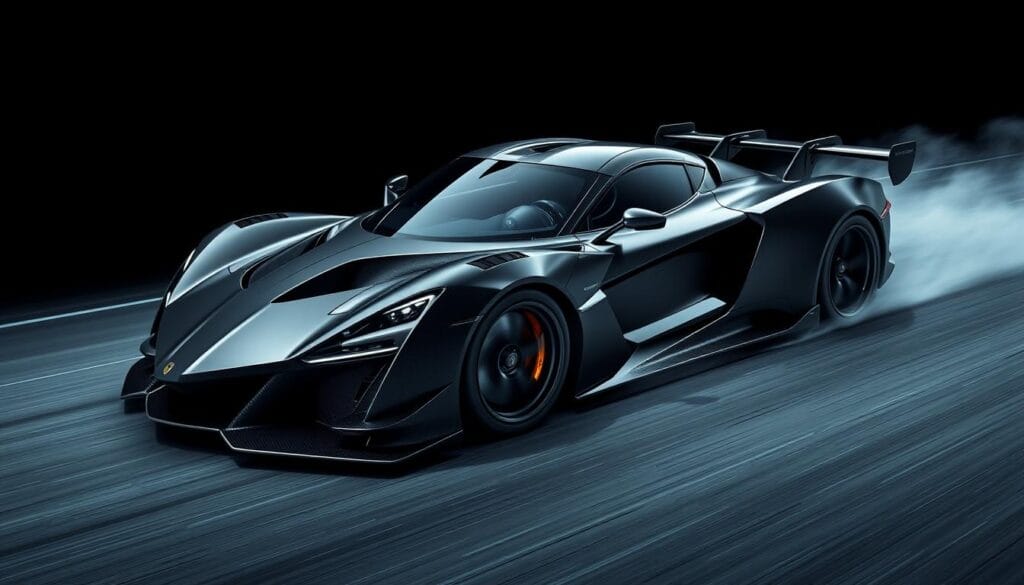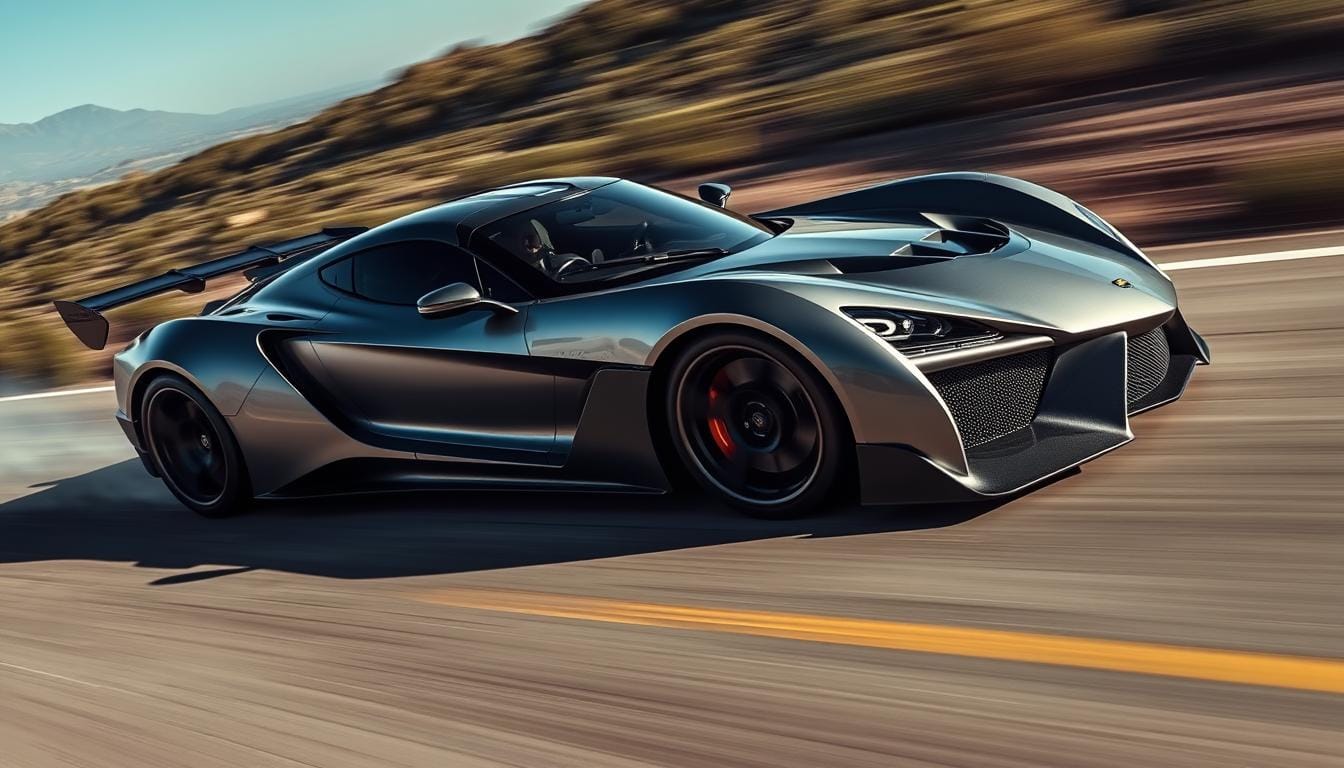Imagine a machine that goes beyond all speed limits. The Hennessey Venom F5 is the top of hypercar speed, made to break all records. It can go up to 328 mph, making it a new chapter in car history.
This is a big moment in car engineering. The Venom F5 is not just fast; it’s a record-breaker that tests new tech. Hennessey Special Vehicles made a car that shows the best of speed and precision.
The Venom F5 aims to be the fastest car ever made. The team worked hard to make a car that can go over 300 mph. This car challenges what we think is possible in cars.
Key Takeaways
- Theoretical top speed of 328 mph
- Cutting-edge American hypercar engineering
- Designed to break the 300 mph speed barrier
- Represents the pinnacle of automotive performance
- Pushes technological boundaries of speed
The Ultimate Speed Machine: Meeting the Venom F5
The Hennessey Venom F5 is a top example of American innovation in high-performance cars. It’s more than a fast car; it shows the best in engineering and ambition.
Birth of an American Hypercar
The Venom F5 came from Hennessey Performance Engineering’s drive for perfection. Based in Texas, the company is known for making amazing cars.
- Established in 1991 by John Hennessey
- Specialized in high-performance vehicle modifications
- Transitioned from tuning to creating original hypercars
Engineering Philosophy
Hennessey aimed to create a car that breaks speed records. They focused on three key areas:
- Lightweight carbon fiber construction
- Extreme power-to-weight ratio
- Aerodynamic precision
Design Evolution
Every update of the Venom F5 brought it closer to perfection. The design team worked hard on the car’s look and aerodynamics for top speed.
The Venom F5 is not just a car—it’s a statement that American engineering can compete with the world’s most prestigious automotive manufacturers.
Breaking Down the Hennessey Venom F5 Top Speed
The Hennessey Venom F5 is a huge leap in hypercar performance. It breaks new ground in what’s possible in car engineering. The top speed of the Hennessey Venom F5 is truly astonishing.
“I think in CFD (Computational Fluid Dynamics simulation software), at the power level that we’re at, it’s 328 miles per hour.” – John Hennessey, founder and CEO of Hennessey Performance Vehicles
Computational fluid dynamics simulations show the car’s amazing abilities. The record-breaking speed comes from several key factors:
- Aerodynamic design for extreme speed
- Lightweight carbon fiber construction
- Powerful twin-turbocharged V8 engine
- Sophisticated wind tunnel testing
To understand the Hennessey Venom F5’s speed, we need to look at its unique engineering. The hypercar’s design aims to cut air resistance while boosting power. Every detail of the car was carefully planned to hit an unmatched top speed.
| Speed Metric | Projected Performance |
|---|---|
| Theoretical Top Speed | 328 mph |
| Computational Simulation Validation | Confirmed through advanced CFD |
| Aerodynamic Efficiency | Drag coefficient optimized for speed |
It’s hard to believe such extreme speeds are possible. The Venom F5’s engineering team has created a car that’s the ultimate in speed and performance. They’ve combined the latest technology with a relentless drive for speed.
Power and Performance Specifications
The Hennessey Venom F5 is a top hypercar, known for its amazing power and design. It has a powerful engine and advanced features.
Twin-Turbo V8 Engine: The Heartbeat of Extreme Speed
The Venom F5’s engine is a huge twin-turbo V8. It’s called the “Fury” and is a 6.6-liter beast. It makes 1,817 horsepower and 1,193 lb-ft of torque.
The engine is made of lightweight aluminum. It has precision-engineered twin-turbochargers and advanced cooling systems. These features help it perform at its best.
Exceptional Power-to-Weight Ratio
The Venom F5’s power-to-weight ratio is amazing. It weighs just 2,998 pounds. This makes it fast and powerful.
| Performance Metric | Specification |
|---|---|
| Horsepower | 1,817 hp |
| Torque | 1,193 lb-ft |
| Weight | 2,998 lbs |
| Power-to-Weight Ratio | 0.61 hp/lb |
Advanced Transmission and Drivetrain
The Venom F5 has a rear-wheel-drive system. It uses a custom single-clutch transmission. This setup allows for quick gear changes and perfect power delivery.
Aerodynamic Innovation and Design

The Hennessey Venom F5 is a top example of aerodynamic design in high-performance cars. Its every detail is designed to enhance speed and stability. The car’s look shows the perfect mix of engineering and style.
Key aerodynamic features of the Venom F5 include:
- Streamlined carbon fiber body that minimizes air resistance
- Active aerodynamic elements that adjust in real-time
- Carefully engineered underbody to generate significant downforce
- Optimized cooling systems integrated into the aerodynamic structure
Designing such a high-performance car is a huge challenge. Hennessey’s team had to meet many goals. They aimed to cut drag, keep the car stable, and cool it well at high speeds.
| Aerodynamic Feature | Performance Impact |
|---|---|
| Carbon Fiber Body | Reduces weight, improves air flow |
| Active Rear Wing | Adjusts for maximum stability |
| Underbody Channeling | Generates critical downforce |
The Venom F5 is not just beautiful; it’s also a marvel of engineering. Its design is a perfect mix of science and art. It shows what’s possible in high-performance cars.
The Quest for 300+ MPH: Challenges and Solutions
Reaching speeds over 300 mph is a huge challenge. It needs top-notch engineering and careful planning. The Hennessey Venom F5 is a bold attempt to beat impossible track records. It pushes the limits of what cars can do.
Going for extreme speed is a test of car tech and human skills. It’s a big challenge.
Tire Technology: The Critical Foundation
Tires are key at high speeds for safety and performance. Hennessey works with Michelin to make special tires. These tires must handle huge forces:
- Reinforced sidewall structures
- Advanced rubber compounds
- Precision manufacturing tolerances
Advanced Testing Facilities
Finding the right place to test speed is hard. It needs a lot of research and planning. The test site must have:
- Extremely long, flat surfaces
- Minimal environmental interference
- Comprehensive safety infrastructure
Safety Considerations
Keeping the driver safe is crucial when trying to break speed records. Important safety features include:
| Safety Component | Specific Requirements |
|---|---|
| Chassis Design | Ultra-rigid carbon fiber construction |
| Cockpit Protection | Advanced impact-resistant materials |
| Crash Systems | Specialized energy absorption mechanisms |
“We’re working very closely with Michelin to ensure our tires can handle what we’re intending to do.” – John Hennessey
Every challenge is a step towards making the Venom F5 a record-breaking car.
Competition in the Hypercar Arena

The world of elite sports cars is a high-stakes battlefield. Here, manufacturers push the limits of what’s possible. Hennessey’s Venom F5 faces off against some of the fastest cars ever made.
Top contenders in this elite hypercar arena include:
- Koenigsegg Jesko Absolut
- SSC Tuatara
- Czinger 21C
Bugatti holds the record for the fastest production car, but there’s controversy. The record was set on Bugatti’s private track, raising questions. True speed requires two-way verification.
The Hennessey Venom F5 shines with its engineering. The hypercar landscape keeps changing, with each maker pushing tech limits for the top speed.
The battle isn’t just about speed. It shows human innovation, engineering skill, and the drive for car excellence. Each maker has a unique way to hit incredible speeds, making the hypercar world thrilling to follow.
Record-Breaking Aspirations
Speed lovers worldwide are excited for the Hennessey Venom F5’s speed test. This hypercar is a top achievement in car engineering. It shows what’s possible with four wheels.
“A two-way average north of 300 mph, but if we could hit 500k or a little bit over 500k in one direction, that would be kind of cool. Those are our goals,” says John Hennessey.
Speed chasing needs careful planning and exact precision. Hennessey’s team aims high, beyond usual car performance.
Two-Way Average Speed Goals
Reaching a two-way average speed is a big task. It needs great consistency and tech skills. The Venom F5 wants to break all records with its amazing speed.
- Target two-way average: Over 300 mph
- Record-breaking speed verification through precise measurement
- Multiple test runs to ensure accuracy
The 500 km/h Target
Reaching 500 km/h (310.686 mph) is a huge challenge. It’s not just a goal but a sign of human creativity and car excellence.
| Speed Milestone | Target | Significance |
|---|---|---|
| Two-Way Average | 300+ mph | Global Speed Record Contender |
| Single Direction | 500 km/h | Unprecedented Performance |
Testing Protocol
Testing is key to proving speed claims. Hennessey will do detailed tests that follow global car standards. This will show the world the Venom F5’s true speed.
- Multiple verification runs
- Standardized measurement techniques
- Independent speed verification
Technical Achievements and Milestones
The Hennessey Venom F5 is a true marvel in automotive engineering. It has broken many track records. This hypercar is at the top of automotive innovation, showing what’s possible in high-performance design.
This car has reached incredible milestones. It has set new standards in performance:
- Highest speed record over a half-mile
- World’s most powerful manual transmission car
- Unprecedented power-to-weight ratio
The Venom F5 shows Hennessey’s dedication to automotive excellence. Every part is engineered for its amazing performance. It’s a highlight in hypercar development.
| Performance Milestone | Achievement Details |
|---|---|
| Half-Mile Speed Record | Unprecedented top speed achievement |
| Manual Transmission Power | Highest power output for a manual transmission vehicle |
| Aerodynamic Design | Advanced computational fluid dynamics optimization |
The Venom F5 goes beyond being a hypercar. It shows human creativity and technological progress in car design.
Conclusion
The Hennessey Venom F5 is more than just a fast car. It shows the passion to go beyond what’s thought possible. Your exploration into extreme car engineering shows a machine that goes beyond speed.
Looking at the Venom F5, you see a car that mixes power with careful design. John Hennessey’s dream is not just to break records. It’s to give a unique driving experience that links the driver with the latest car tech.
The Venom F5 sets a new standard for car design. It shows the power of American engineering. Each step forward brings us closer to new car performance limits.
The chase for the fastest speed is exciting. But the Venom F5 teaches us that true car greatness is more. It’s about passion, precision, and the endless human desire to explore new limits.
FAQ
What is the top speed goal for the Hennessey Venom F5?
The Hennessey Venom F5 aims to hit over 300 mph. It’s predicted to reach 328 mph, thanks to advanced simulations. The goal is to average over 300 mph in both directions and hit 310.686 mph in one direction.
How much horsepower does the Venom F5 produce?
The Venom F5 is expected to have over 1,800 horsepower. This comes from its powerful twin-turbocharged V8 engine. It’s one of the most powerful cars available.
What makes the Hennessey Venom F5 unique in the hypercar market?
The Venom F5 is special because it’s made in America. It’s designed for extreme speed and has advanced aerodynamics. Its power and light weight make it a top performer.
What challenges does Hennessey face in achieving its top speed goal?
Hennessey faces big challenges. They need tires that can handle high forces and safe testing facilities. They also have to keep the car stable at such speeds.
How does the Venom F5 compare to other hypercars?
The Venom F5 is up against Bugatti, Koenigsegg, and SSC. It’s a strong contender for the fastest production car title.
What specific technical achievements has the Venom F5 already accomplished?
The Venom F5 has set records. It’s the world’s most powerful manual transmission car. It’s also shown impressive speeds over a half-mile, showing its engineering skills.
How is the Venom F5’s aerodynamic design unique?
The Venom F5’s design is all about speed and stability. Every part is made to cut down drag and boost downforce. It uses active aerodynamics to stay stable at high speeds.
What is the significance of breaking the 300 mph barrier?
Crossing 300 mph is a big deal in car engineering. It shows what’s possible in a road-legal car. It’s a sign of the top of car performance and tech.





